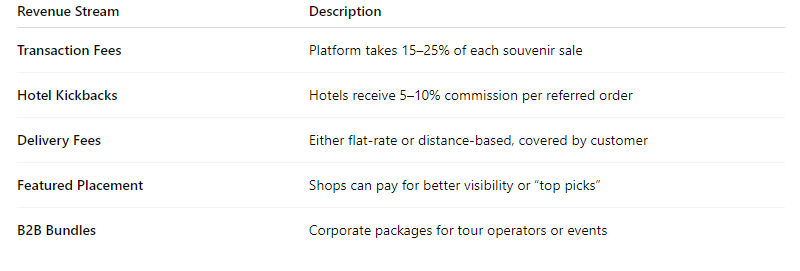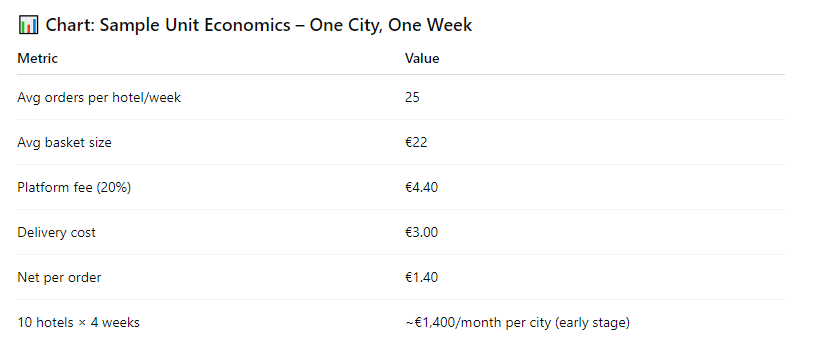The T-Shirt at Checkout: How Hotels Could Power the Next Local Amazon
Why It’s Hot
You just wrapped up a weekend in Rome. Your suitcase is full of espresso capsules, but you forgot the one thing you promised your niece: a Coliseum t-shirt. No time to shop, and your flight’s in the morning.
But what if you could order that shirt from your hotel room — and have it waiting at the front desk by breakfast?
That’s the big unlock: a souvenir delivery platform that connects local gift shops, hotels, and tourists into one seamless flow. No retail bag. No shipping form. Just a tap, a click, and a thank-you from your concierge.
In an era where tourists expect on-demand everything, and hotels are desperate to differentiate without adding operational overhead, this model delivers — literally.
It’s the kind of idea that makes perfect sense in hindsight. And it’s primed for smart founders to build first in tourist-saturated cities like Rome, Paris, or NYC, before rolling out globally.
The Big Idea & Value Proposition
The concept: a city-specific e-commerce platform for same-day or next-day delivery of local souvenirs — facilitated through hotels.
Think of it as Uber Eats meets the gift shop, with a commission baked in for everyone involved.
Here’s how it works:
🛍️ Local gift shops upload their inventory (mugs, t-shirts, books, magnets, etc.)
🏨 Hotels share a QR code or landing page with guests at check-in
📦 Guests browse and buy souvenirs online, without leaving the room
🛎️ Orders are delivered to the front desk (or even the room) within 24 hours
💸 Shops get visibility, hotels get a cut, tourists get convenience
Why it clicks:
Tourists don’t want to carry stuff around — or waste time shopping during a short stay.
Hotels want to add value without stocking physical items.
Shops struggle with foot traffic and lack any real tech presence.
This model compresses a broken experience into a one-click transaction, and everyone benefits.
What’s next: the market opportunity and players, the business model and growth path, and a step-by-step playbook for launching lean.
Teaser of remaining sections:
The Market & The Players
How It Makes Money & Grows
The Playbook: From Pilot to Scale(Premium content continues below this line.)
The Market & The Players
This idea sits at the intersection of three converging trends:
Right now, the gift shop is one of the last holdouts of offline-only commerce. Platforms like Amazon or Shopify don’t make sense for one-off tourist sales. And many hotels have closed their in-house shops entirely.
Competitors? Mostly fragmented:
Gift shop owners using WhatsApp to coordinate custom deliveries.
Tour guide operators selling small-batch items after tours.
Etsy sellers who don’t offer local delivery or real-time logistics.
That’s the gap: a platform that connects physical product + local inventory + last-mile delivery, all under a tourism-first UX.
How It Makes Money & Grows
This is a low-overhead, commission-first model with multiple monetization layers.
Here’s how the economics might look:
📈 Over time, expansion to multiple hotels, higher-margin items, and concierge upselling could push ARPU significantly higher.
The Playbook: From Pilot to Scale
This is a business that’s shockingly lean to validate. Here’s how a solo founder or small team could launch in 30–60 days:
Pick one tourist-heavy neighborhood
Start with 3–5 boutique hotels and 5–10 local shops.Build a no-code catalog
Use Glide, Webflow, or Shopify Lite to showcase products.Create hotel onboarding kits
Provide QR code signage + email templates + basic training for concierges.Do delivery yourself (initially)
Use a bike or scooter for 24-hour drop-offs to validate volume and timing.Refine based on data
Optimize delivery windows, product categories, and hotel placement.Automate logistics later
Partner with local couriers or integrate with last-mile APIs once volume increases.
📌 Summary Table: Why This Business Works
Final Thought
In an era where tourists expect convenience, and hotels want differentiation, this business model hits a sweet spot:
Local inventory meets on-demand behavior
Small shops meet digital scale
Concierges meet Amazon logic
Whether you call it CityDrop, Tourist Touch, or Souvenir Concierge, this is the kind of overlooked, city-specific platform that could quietly print money — one t-shirt at a time.





